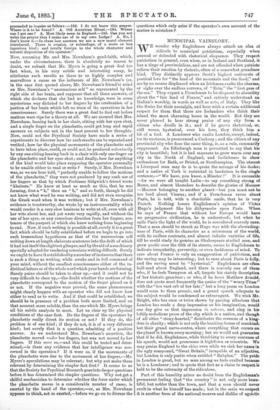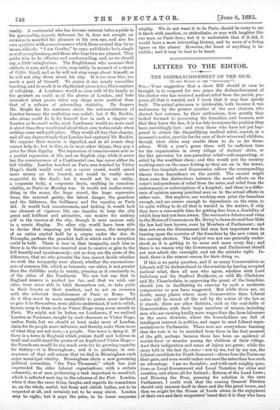MUNICIPAL VAINGLORY.
WE wonder why Englishmen always attach an idea of ridicule to municipal patriotism, especially wheu avowed or defended with rhetorical eloquence. They respect patriotism in general, even when, as in Ireland and Scotland, it has a tinge of provincialism, and are not offended when patriots relieve their emotion by rhetoric, often of a somewhat grandiose kind. They distinctly approve Scott's highest outbursts of poetical love for "the land of the mountain and the flood," and are by no means displeased when an Irishman exalts the charms, or sighs over the endless sorrows, of "Erin," the "first gem of the sea." They expect a Frenchman to be eloquent to absurdity about the "fair land of France," and entirely understand an Italian's worship, in words as well as acts, of Italy. They like the Swiss for their nostalgia, and hear with a certain additional respect for them that there are Icelanders who think their island the most charming home in the world. But they are never pleased to hear strong praise of any city from a citizen who dwells in it ; and if he grows rhetorical, or, still worse, hysterical, over his love, they think him a bit of a fool. A Londoner who exalts London, except, indeed, for its vastness, is pronounced a Cockney ; and the citizen of any provincial city who does the same thing, is, as a rule, summarily suppressed. An Edinburgh man is permitted to say that his city is beautiful; but it is bad manners to grow warm over any city in the North of England, and foolishness to show enthusiasm for Bath, or Bristol, or Southampton. The utmost a Liverpool man may do is to quote the acreage of his docks; and a native of York is restricted in laudation to the single sentence,—" We have, you know, a Minster !" It is excusable
—for we were all taught Latin—to say something strong of Rome, and almost blameless to describe the glories of Moscow —Moscow belonging to another planet—but you must not be too loud about Vienna; and if a Frenchman raves about Paris, he is told, with a charitable smile, that he is very
French. Nothing lowers Englishmen's opinion of Victor Hugo's judgment like his dithyrambs upon Paris. When he says of France that without her Europe would have no progressive civilisation, he is understood; but when he calls Paris the light of the world, he is considered scarcely sane. That a man should be struck as Hugo was with the aboundingness of Paris, with its character as a microcosm of the world, with its endless contrasts, and almost infinite varieties of life, till he could study its gamins as Shakespeare studied men, and grow poetic over the filth of its streets, seems to Englishmen to indicate irregularity, perversity, or even feebleness of mind. To rave about France is only an exaggeration of patriotism, and the raving may be interesting; but to rave about Paris is folly, and the raving must be "hysterical." Englishmen are often half-mad about England, and there is scarcely one of them who, if he feels Tennyson at all, forgets his stately description of her historic grandeur ; or who, if he loves Matthew Arnold, does not quote most frequently the praise of the "weary Titan" with the " too vast orb of her fate ;" but a long poem on London would seem to them prosaic, and a grand speech adequate to the subject would be condemned as extravagant. We wish Mr. Bright, who has once or twice shown by passing allusions that London has made a deep impression on his imagination, would one day give us that impression in extenso, and sing in his loftily melodious prose of the city which is a nation, and though of all cities "stony-hearted," distributes the revenue of a kingdom in charity; which is not only the banking-house of mankind, but their end nerve-centre, where everything that occurs on the planet is known every morning; but we would not guarantee that if he did, Englishmen, while throbbing to every sentence of his speech, would not pronounce it highflown or eccentric. We may praise England to the skies even while we sink her name in the ugly compound, "Great Britain," incapable of an adjective, but London is only poetic when entitled "Babylon." The pride in London is great, but no man among us feels exalted because he is a Londoner ; and to quote that fact as a claim to respect is held to be the extremity of the ridiculous.
Part of this humility arises no doubt from the Englishman's permanent feeling that "the country" is not only more beautiful, bat nobler than the town, and that a man should never exult in what he himself has made ; but in the main we gasped it is another form of the national reserve and dislike of egoistic
vanity. A continental who has become eminent takes a pride in his personality, expects deference for it, does not scruple on occasion to manifest his pleasure in his own ego, and airs his own qualities with a consciousness which those around him by no means ridicule. "I am Goethe," he says, and thinks he is simple as well as explanatory, and those who hear him are pleased. They prefer him to be effusive and condescending, and, as we should say, a little vainglorious. The Englishman who assumes that attitude is rare, and, as a rule, may safely be accused of a strain of Celtic blood, and as he will not sing songs about himself, so he will not sing them about his city. It is too near him, too much a part of himielf. To praise it too nearly resembles boasting, and to exalt it in rhythmical prose is too like a rapture of self-glory. A Londoner would as soon talk of his family as the greatest on earth as of the glories of London, and feels immodest when praise takes any shape more poetical than that of a column of astounding statistics. He forgave Mr. Bright for his sentences about the unknowableness of London because the exaltation was veiled ; but if Mr. Ruskin, who alone could do it, let himself flow in such a chapter on London as he could write, most Londoners would no more read it aloud than they would read aloud their own testimonials when seeking some well-paid place. They would all buy that chapter, and all say deprecatingly that London had captured Mr. Ruskin. We suppose their reserve is dignified, and at all events they cannot help it; but in this, as in most other things, they pay a price for their dignity. The repression of consciousness acts as a partial repression of life, and an English city, while it never has the consciousness of a Continental one, has never either its full vitality. London touched as Paris was touched by Victor Hugo's death would send out a vaster crowd, would spend more money on his funeral, and would be vastly more respectful to the dead ; but it would not be an entity, a corporate body, a corporate brain, exulting in conscious vitality, as Paris on Monday was. It would not realise everything in the scene, the huge crowd, the huge repressive force, the external gaiety, the latent danger, the grandeur and the littleness, the brilliancy and the squalor, as Paris did. It would lack consciousness, and lacking it, would lack one element of vigorous life, one impulse to keep the city great and brilliant and attractive, one motive for sinking self in the success of the city, though it were success only in a scenic display. No other city would have been able to devise that imposing yet histrionic scene, the reception of an entire capital held by a corpse under the Arc de Triomphe, perhaps the grandest ball in which such a reception could be held. There is loss in that incapacity, such loss as there is in the nature too reserved ever to receive or give to the full heartily and spontaneously; yet so deep are the roots of the difference, that we who perceive the loss cannot decide whether we wish the incapacity were absents whether the unconsciousness of common life, which so benumbs our cities, is not greater than the childlike unity in vanity, pleasing as it constantly is, of the cities of the Continent. We can but say that in England reserve is pushed too far, and that we wish our cities were more able to trick themselves out, to take pride in their beauty or their conduct, and to act on occasion with the coherent impulsiveness of Paris or Rome. To do it they must be more susceptible to praise, more inclined to give it to themselves, more able to understand, if not to relish, hymns sung to them such as Victor Hugo sung every month to Paris. We might not be better, we Londoners, if we realised London as Parisians, taught by such charmers as Victor Hugo, realise Paris, but we should at least make more of London, claim for its people more influence, and thereby make them more of what they are not now,—a people. One town is doing it. If there is a town in England which praises itself and believes in itself and could stand the praise of an Anglicised Victor Hugo— the French one would be too much even for its growing capacity for flattery—it is Birmingham ; and it is, perhaps, in consequence of that self-esteem that we find in Birmingham such eager municipal vitality. Birmingham elects a new governing political committee, "the Two Thousand," which has just superseded the older Liberal organisations, with a certain solemnity, as of men performing a task important to mankind, which is reflected next day in the columns of the Post. London, when it does the same thing, laughs, and regards its committees as, on the whole, useful, but fussy and cittish bodies, not to be respected at all, and certainly not to be sung about. London may be right; but it pays the price, in its lower corporate
vitality. We do not want it to be Paris, should be sorry to see it throb with emotion, or attitudinise, or roar with laughter like one man, as Paris does; but it is undeniable that if it did, it would have a more interesting history, and be more of a living figure on the planet. However, the heart of anything is invisible; and it may be best to be heart.



































 Previous page
Previous page